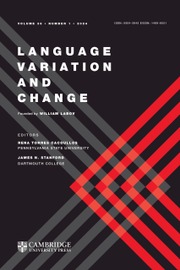Article contents
Linguistic change in endangered dialects: The case of alternation between avoir and être in Vermont French
Published online by Cambridge University Press: 01 March 1999
Abstract
The present study examines the pattern of the variation of the auxiliary avoir and être in the passé composé tense in Vermont French in 22 adult speakers who migrated from Québec or are first-generation Franco-Americans. The purpose of the study is to determine if the process of replacement of être by avoir in progress in Canadian French is also taking place in Vermont and which linguistic and social constraints influence this linguistic change. Results of the study reveal that the process of replacement of être by avoir is also taking place in Vermont, and that it is significantly favored by the presence of a main verb that has a transitive homonym and by the presence of a low-frequency main verb. The fact that social factors do not significantly influence this replacement indicates a later stage of linguistic change, supporting patterns found in the literature of language death.
- Type
- Research Article
- Information
- Copyright
- © 1999 Cambridge University Press
- 10
- Cited by


